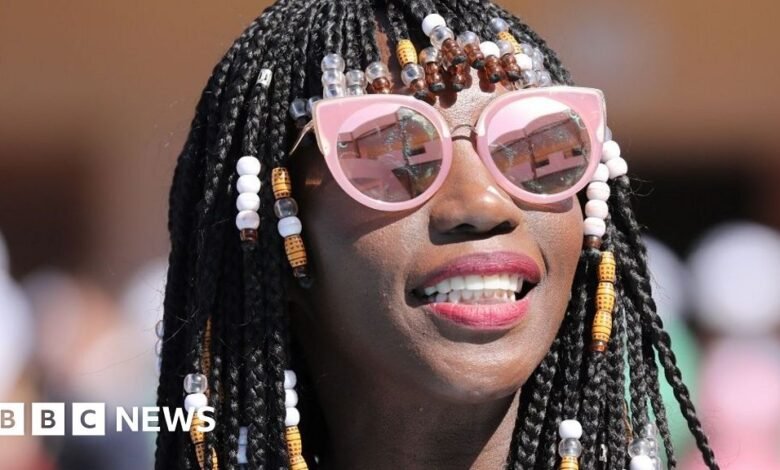Senegal theatre reverses wig ban after backlash

The sudden ban and vice versa have ignited a wig, hair equipment, and pores and skin lighting merchandise in a distinguished theater within the capital of Senegal, Dakar, a widespread violent response – put deeply bare tensions about sexual id and cultural and medical coverage within the Western African nation.
The interior memorandum was concluded by the Nationwide Ministry of Tradition and issued on Monday by Sergeni Fall Gwi, director of Graâtre de Dakar.
He mentioned this step is to “improve Africa’s values” and defend the cultural picture of the Basis.
However critics accused Ghai of linking the our bodies of girls underneath the guise of cultural pleasure, and the ban was mirrored within the subsequent day.
Feminist teams and civil society leaders mentioned that the memorandum displays broader considerations about gender inequality in Senegal, particularly given the lower within the variety of girls within the administration of President Pasero Dewmay Fi – 4 out of 25 – and the removing of the Ministry of Ladies.
Many social media customers have criticized the ban as sexual bias, invading and father.
This controversy was extra sophisticated by the Sergen Fall Goy’s political background. Earlier than his appointment to The Grand Théâtre in early 2024, Guèye was a outstanding determine in Pastef-the ruling occasion recognized for his anti-colonial speech, African public.
At the moment, he led the occasion’s technical and cultural committee, and defended a return to what he known as “genuine African values”.
Critics are afraid that the ideology of the persona is now bleeding to what it needs to be a impartial common entity.
“This isn’t a matter of wigs or pores and skin,” says political analyst Fatoumata Ba. “It involves enjoying a wider energy – state establishments are used to impose a selected copy of the id, with silence or marginalization of anybody who doesn’t agree.”
One of the crucial broadly joint responses got here from Henriet Niang Sweet, a feminist analyst and a common thinker, who questioned the logic and the intention behind the ban on a publication of viral social media, saying:
As for [hair] Raids and borrowed hair, ought to we point out this director that these are aesthetic and generally financial choices, are sometimes sensible? Can we stop males from shaving their heads to cover baldness? Who sporting false collars to extend their necks? ”
Supporters of the ban which were canceled now argue, though within the minority, the director’s intention was rooted in cultural pleasure, not persecution. Man himself defended the memo as a part of a broader job “restoring the African dignity and id”, particularly within the arts sector, which is believed to be excessively affected by European magnificence requirements.
Nonetheless, critics say that such insurance policies cut back the cultural pleasure of the bodily look – whereas ignoring deeper systemic points.
“If you happen to actually need to verify the African id,” the sociologist Mami Diara Tham says to the British Broadcasting Authority, “Begin with language, schooling and financial justice – don’t prohibit weaving and pores and skin [lightening] beneficiant”.
By Tuesday, within the face of escalating stress, Sergeni Fall Goy was compelled to reverse the ban, citing the misunderstanding and repeated his dedication to the theater’s mission. However the harm has already occurred.
It has revealed an rising dissatisfaction with the founding father of Pastef and Prime Minister Sonko between city youth and progressive civil society, whom they supported within the 2024 elections, however they’re now betrayed by the governorate that’s seen to its authorities and the centralization of energy.
In essence, the borrowing and whitening ban in The Grand Théâtre was not solely about aesthetics – it was about those that decide cultural originality, at what value.
In a rustic the place pores and skin lighting merchandise stay widespread regardless of the nicely -known well being dangers, and the place the looks of girls is commonly topic to ethical scrutiny, the dialogue is way from superficial. It touches the id after colonialism, gender inequality, financial necessity, and private freedom.
At present, the ban has ended – however the broader discussions that it raised stay alive.
2025-07-17 16:05:00





